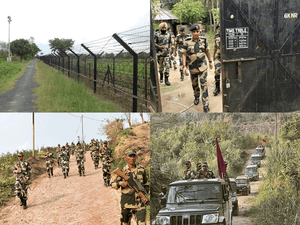
Amid turmoil in Bangladesh, a high alert has been sounded in India’s bordering areas with the neighbouring nation where the situation has become extremely volatile following protests over a quota-related issue.
Bangladesh Prime Minister Sheikh Hasina has resigned and reportedly left for an “undisclosed location”.
A top-ranking Border Security Force (BSF) officer said in Agartala that all senior border guarding officials and commandants had rushed to the border, and have been maintaining tight vigilance along the frontiers.
“Our troops are on high alert along the border with Bangladesh. We have almost sealed the border,” the official told Thebetterandhra.com , unwilling to be named.
He also said that in the backdrop of the chaos and unrest in Bangladesh, no untoward incident or infiltration bid so far has happened along the India-Bangladesh border areas.
Previously, during Bangladesh unrest, many political leaders of different political parties, including Awami League, took shelter in Tripura and West Bengal.
Five Indian states – West Bengal, Tripura, Meghalaya, Mizoram and Assam — share a total of 4,096-km border with Bangladesh.
Earlier, there were reports that Hasina’s helicopter may land in Agartala airport, the nearest Indian airport from Dhaka. However, there was no official confirmation till the filing of this report about her actual destination.
Officials of Bangladesh Assistant High Commissions in Guwahati and Agartala have submitted that they have no information about Hasina.
On Monday, a section of the crowd in Dhaka vandalised a statue of former Bangladesh President and the country’s Independence leader Sheikh Mujibur Rahman, the father of Sheikh Hasina.
Earlier in an address to the nation, Bangladesh Army Chief General Waker-Uz-Zaman announced that Sheikh Hasina has resigned as the Prime Minister, and an interim government will be formed soon to run the country.
The Army chief also said that he will be meeting President Mohammed Shahabuddin soon.
The developments followed after over 100 people were killed and more than 1,000 injured in the clashes that took place between police and protesters on Sunday. “With yesterday’s count, the death toll in anti-government protests crossed 300 in just three weeks, making it the bloodiest period in the history of Bangladesh’s civil movement,” Bangladesh’s leading daily ‘The Daily Star’ reported.
The student-led non-cooperation movement put immense pressure on the government led by Prime Minister Hasina over the past many weeks.
The students had been protesting against a 30 per cent reservation in government jobs for relatives of freedom fighters who wrested independence for Bangladesh from Pakistan in a bloody civil war in 1971 in which, according to Dhaka officials, 3 million people were killed in the genocide by Pakistani troops and their supporters.
After the Bangladeshi Supreme Court slashed the reservations to 5 per cent, student leaders put the protests on hold but the demonstrations flared up because the students said the government ignored their call to release all their leaders, making the resignation of Hasina their primary demand.











